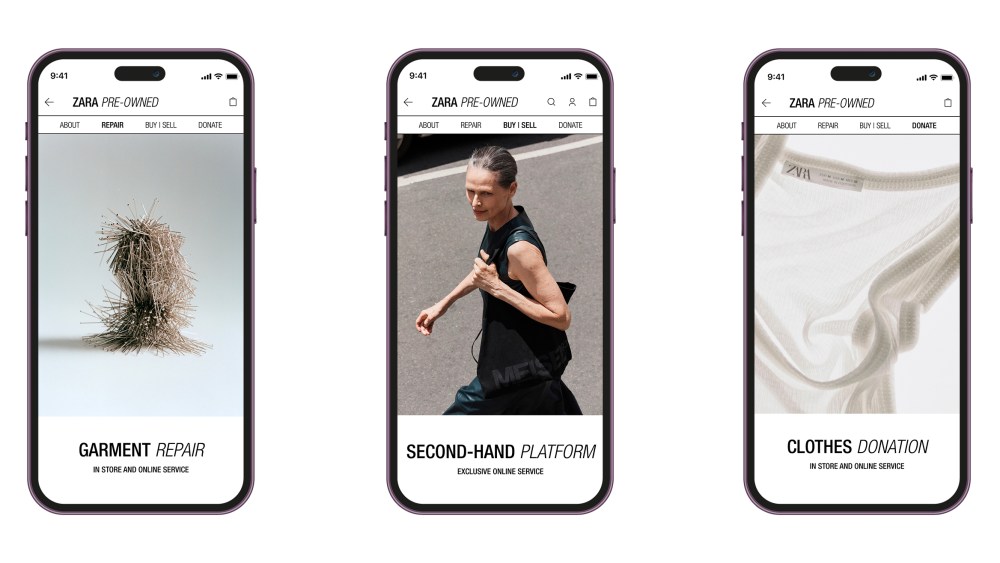After launching the “Pre-Owned” platform in 16 countries including Italy, the U.K. and France, Zara is bringing its circularity initiative to the U.S. market.
This is the first international market outside of Europe where Zara is expanding its initiative. Inditex first announced this news during its 2024 first-half earnings report. Launching nationwide Tuesday, customers can access the Pre-Owned platform on Zara’s website, the Zara app and in Zara stores.
The platform has three major pillars: repair, resell and donate. Its repair service will allow customers to request a repair of any Zara garment from any season, from replacing buttons and zippers to seams. The resell option allows customers to sell Zara garments from any collection organized by product categories with detailed information about the item, including Zara’s original information about the garment and images by the seller.
Zara said its goal is to offer customers a complete approach to circularity and extend the life of their clothes through its internally developed artificial intelligence that matches customers’ photos, names and descriptions to the website. When a customer is looking to resell, they can take a photo of the photo and upload it to the Pre-Owned platform, which will automatically populate with the original item images and details and the reseller only needs to add in its sizing and condition of the item.
And customers can donate their clothes to nonprofit organizations — with the products classified as reuse whenever possible or recycled if the products have been determined to be at the end of their life cycle. New York City customers also have the option of requesting their items be picked up at their homes with their online orders.

Zara’s “Pre-Owned” program.
The company works directly with more than 90 local community organizations to donate to vulnerable communities or situations or resell to help finance community projects — in the U.S. market, Zara is working with the Salvation Army. With donated products that are unable to be reused, they are turned into new materials for industrial use or transformed into new textile fibers.
Zara said through its donation program, the company helped recover more than 20,000 tons of garments and footwear in 2023; in 2022, it recovered more than 17,000 tons. The program’s partners shared that in 2023, 67 percent of all garments were reused and donated to people in vulnerable situations or resold to help finance community projects. And the remaining 33 percent that weren’t reused based on the conditions of the items went primarily down cycling or were used as a last resort for energy recovery.
Paula Ampuero, head of sustainability at Zara, told WWD that the launch of the project within the U.S. is to help the company’s “American customers to extend the life cycle of their Zara garments through repair, resale or donation” and “envision a world in which every Zara garment is reused and recycled.”
Moreover, Ampuero said the platform’s launch is a priority for the Inditex Group’s line of action for “responsible consumption and a circular economy model,” with the launch of the platform in key Zara markets by 2025. She went on to explain that the company is pioneering the development of “new, more sustainable fibers” while “fostering the decarbonization of the textile industry.”
The four lines of priority action for Inditex Group include: only using textile materials with less impact on the environment by 2030; promoting a supply chain transformation that is social and environmentally focused on water, chemical and energy management; supporting projects to protect, restore and regenerate 12.3 million acres of land and contribute to biodiversity improvement and expanding on its circularity initiatives. The company said putting these items in place will reduce their emissions by more than 50 percent by 2030 in its effort to work toward the goal of achieving neutral emissions by 2040 with a 90 percent reduction.
Other sustainable initiatives of Inditex include investing in Boston-based lab-grown cotton start-up Galy, partnering with textile recycling tech company Circ on a second collection, and being a major shareholder of Finnish fashion and textile tech company Infinited Fiber Company.
“The evolution of our Pre-Owned service in Europe has showed us that this type of service can offer utility for consumers. Brands play an important role not only in responding to consumer demand but also in proactively introducing solutions,” said Ampuero.

